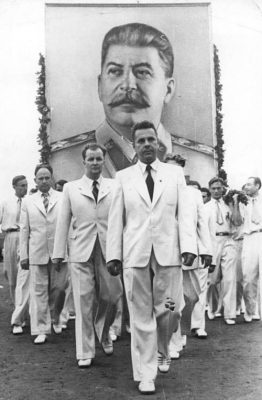Joseph Stalin is one of the most prominent figures in Russian history. He is admired and condemned at the same time for his actions during his dictatorial rule in the former Soviet Union. Whether as a great nation-builder or a murderous political tyrant, his actions have definitely shaped modern Russia.
Rapid Industrialization
The greatest legacy of the Soviet dictator, Joseph Stalin, was the rapid industrialization of Russia. Stalin was convinced that Russia had the potential to become one of the world’s economic superpowers. He set up the program of collectivized agriculture, which had land seized from peasants and turned them back into serfs. Still, despite criticism, the program led to massive agricultural growth in Russia.
In less than ten years after becoming a totalitarian dictator, Stalin improved the nation’s industrial production to a level that was second only to the United States. Back in 1913, Russia ranked only fifth in industrial production. This achievement becomes even more remarkable in light of tragedies that have tormented Russia in the intervening years, such as war, famine, civil war, and epidemics. Stalin also initiated the policy of rapid urban development, and this policy was resumed even after his death. Back in 1937, Russia had 56 percent of its population employed in agriculture. By 1958, that figure had decreased to 42 percent because of Stalin’s programs.
Introduction of Five-Year Plans
Stalin’s introduction of five-year plans is another one of his more important legacies. He supported the promotion of heavy-materials manufacturing in order to enable Russia to gain the upper hand against capitalist nations. Due to speedy industrialization, the yearly growth rate during Stalin’s time climbed to 13 percent. As new products flooded the market, Russia transformed into an industrial powerhouse.
Education and Healthcare
Education and healthcare also flourished under Stalin’s rule. The dictator supported not only women’s education but also women’s rights and their chances at employment. The literacy rate soared to unprecedented levels during Stalin’s time, with a large portion of the population being able to enter universities and enjoy a decent education. But education was not the only aspect that progressed during Stalin’s rule, as the healthcare system was also able to render service to most Russians. Medicines and hospital care became easily available to a large portion of the population, and because of this, terrible diseases of the time decreased to their lowest figures.
Use of a Bureaucratic Machine
Stalin created an intricately bureaucratized governmental machine founded on the interlocking functions of the legislative bodies, political police, armed forces, and the Communist Party. In the many years after Stalin’s death, these continued to function and operate in the management of Soviet society, controlled by figures who gained power during Stalin’s regime. However, the one-man rule that Stalin so expertly wielded did not extend past his death. After he died, the Communist Party enjoyed a resurgence as the dominant power. Stalin’s power inheritors became party leaders, but they could not consolidate power as much as Stalin did.
Promotion of Art
Georgia was Stalin’s home country, then a part of the Russian empire, but he encouraged the flourishing of Russian art and literature. He admired Russian heroes and urged people to look up to them. Stalin’s rule allotted emphasis on sculpting, painting, and music.
Stopping Hitler’s Advance
Stalin and Hitler signed a non-aggression pact in 1939, wherein they agreed not to attack each other in the next ten years, and enabled them to divide Poland between themselves. Hitler violated the pact in 1941 by attacking Russia. Russian troops suffered massive losses in the early stages of the war, but Stalin took over the army and stopped the Nazi forces. The Germans were ultimately forced to retreat and leave Russia alone. As a result, Stalin enjoyed immense adoration as a heroic protector of Russia. After World War 2, Stalin became one of the most influential global figures, along with Winston Churchill, Franklin Roosevelt, and Harry S. Truman. In 1949, the Soviet Union exploded its own atomic bomb, announcing the U.S.S.R. as a world power.
Contradictory Assessments Among Modern Historians
Although Stalin affected millions of lives, his effect on the modern world cannot be clearly determined yet. Historians point out that his achievements are often counterbalanced by the controversial actions he committed. Some scholars state that Stalin was great, but his greatness manifested mostly in criminality. Other scholars say that Stalin’s fame rests only on his cruelty and that he failed to show inventiveness. Still, there are others who disagree, claiming that Stalin exhibited political inventiveness, which enabled him to attain remarkable political domination. Despite being a debatable political figure, Russia’s rise as an industrial power directly resulted from Stalin’s policies. Before Stalin, Russia was an agricultural country. As the end of Stalin’s rule neared, Russia became a feared global power, having exploded its own atomic bomb.
